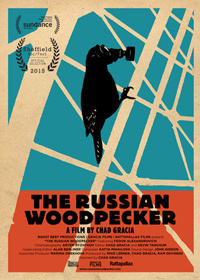Signals Over The Air: First Time Filmmaker Chad Gracia Sees Russian Conspiracy Theory Transform Into Truth
 At the dark heart of director Chad Gracia’s messy, impassioned film lives a Soviet saturated mystery decades old, unearthed by a Ukrainian artist with a wild theory that links a massive cold war relic with the Chernobyl disaster that scarred him at the age of just 4 years old. Like the makeshift, slapdash works of art produced by Fedor Alexandrovich, the mop-topped artist and conspiracy theorist at the center of film, The Russian Woodpecker is a kaleidoscopic collage of on the ground documentation of the riots taking place in Kiev, remarkably invasive sleuth-like interviews, patchworks of news reporting that spans decades, arranged bits of performance art and making-of journalistic flourishes that all coalesce into one rigorous and riotous bit of frightening non-fiction that sees Soviet secrets and modern Russian maneuvers begin to move as one stone-faced offensive that harkens back to an age of fascist terror once thought to be dead and buried.
At the dark heart of director Chad Gracia’s messy, impassioned film lives a Soviet saturated mystery decades old, unearthed by a Ukrainian artist with a wild theory that links a massive cold war relic with the Chernobyl disaster that scarred him at the age of just 4 years old. Like the makeshift, slapdash works of art produced by Fedor Alexandrovich, the mop-topped artist and conspiracy theorist at the center of film, The Russian Woodpecker is a kaleidoscopic collage of on the ground documentation of the riots taking place in Kiev, remarkably invasive sleuth-like interviews, patchworks of news reporting that spans decades, arranged bits of performance art and making-of journalistic flourishes that all coalesce into one rigorous and riotous bit of frightening non-fiction that sees Soviet secrets and modern Russian maneuvers begin to move as one stone-faced offensive that harkens back to an age of fascist terror once thought to be dead and buried.
Fascinated by the furtive public knowledge of the Duga, a mysterious Russian radio antenna embodied by a wall of gnarled steel that towers above the rich, radiating forest that lines the radioactive Chernobyl Exclusion Zone, Fedor launches an investigation of the abandoned project with the same impudent gusto that he puts forth in his various artistic endeavors as playwright, painter or performance artist. His research takes him into libraries, apprehensive research facilities and even the restricted irradiated area of Chernobyl itself (see the insane still above in which Fedor climbed to the top of his mighty metal adversary).
The Duga, which became active in 1976, was dubbed The Russian Woodpecker after baffling the world by cryptically beaming out a massive radio signal that jammed and interfered with radio frequencies by producing an uninterrupted repetitive tapping noise. Fedor’s far-fetched theory is that the Duga was actually a multi billion dollar weapon that failed to produce results, thus the heads of state at the time purposefully used Chernobyl as a means to abandon the project, saving themselves in the process.
But what makes Gracia’s film so enthralling is that he sees Fedor actually going forth with this theory, through straightforward research and the occasional covert conversation, managing to speak to a lengthy list of high up officials that oversaw the Duga project, worked within the Chernobyl facility or posed as post-disaster researchers, and in the process, gleaning unsettling incited into how the projects were run. What he finds, though not solid proof or admissions of such horror, is alarmingly close to what he feared. And what’s more disquieting is the fact that as he dug deeper into state secrecy, Fedor was warned by the Ukrainian secret police, then under the control of the pro-Russian President Yanukovych, to halt his investigation or risk the safety of his family, effectively squelching further progress toward the truth.
Due to the fact that the Chernobyl archives are classified, it’s impossible to know for certain if Fedor’s claims could be validated, but it’s unreasonable to ignore the duplicitous actions of the men in charge of both Chernobyl and the Duga, nor the threats on Fedor’s family. There is undoubtedly something appalling yet lingering below the surface, but the governmental intimidation that still lingers within the Ukrainian borders is hampering the restoration of national trust and governmental accountability. With the ongoing political uncertainty in the region, the fact that another Duga deep within Siberia has recently become reactivated is worrisome to say the least, but with renegades like Fedor, Gracia and their small team of filmmakers calling attention to state secrecy, hope remains. Vibrating with a reckless creative urgency, The Russian Woodpecker is a call for political integrity lost long ago, attempting to drill through invalid indoctrinations through sheer will and sobering truth. The world could use more brave souls like these, using research and authenticity as a weapon for political progress.


